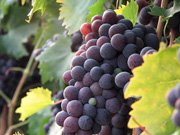|
Bartenders Guide: Wine
"Le vin, il naît, puis il vit, mais point ne meurt, en l'homme il survit." While I will offer valuable and in-depth information about wine throughout this site, this page is intended as a starting point for newcomers. Wine can be very intimidating, and it doesn't need to be. Therefore, I will organize it into a logical progression of topics that will ensure anyone can leave with a well-rounded understanding of wine. In place of my usual entertaining quips, I offer this single piece of advice: 99% of learning anything, is vocabulary. Doctors learn of contusions and pancreatitis. Lawyers talk about tort law and injunctions. Stockbrokers speak of hedges and dividends. If you want to move within a circle of people, you must speak the language that they are fluent in. In order to understand wine, you must be able to understand and converse in the language of wine. To ensure your success, I will include links to my extensive glossary of wine-related terms, (and their pronounciation...nobody's leaving my site looking like a fool) wherever possible. Trust me, and give yourself a chance. It ain't that hard. :)
The Basics of Wine Production The Essential Grapes Wine Tasting A Quick Explanation of American and European Wine Concepts How to Read an American Wine Label How to Read a German Wine Label How to Read an Italian Wine Label How to Read a French Wine Label How to read a Spanish Wine Label Selecting Glassware The Basics of Food & Wine Pairing Formal Wine Service Etiquette Wine Tools & Equipment
Wine is an alcoholic beverage made from the fermentation of grape juice. Wine is produced by fermenting crushed grapes and then adding yeast to the juice, which consumes the sugars found in the grapes and convert them into alcohol. Many varieties of grapes and strains of yeasts are used depending on the types of wine produced. Although other fruits such as apples and berries can also be fermented, the resultant "wines" are normally named after the fruit from which they are produced (for example, apple wine or elderberry wine) and are generically known as fruit wine or country wine (not to be confused with the French term vin du pays). Other fermented beverages, such as barley wine and rice wine (e.g. sake), are made from starch-based materials and are closer to beer and spirit than wine. In these cases, the use of the term "wine" is a reference to the higher alcohol content, rather than production process. The commercial use of the word "wine" is usually protected by law and refers specifically to a grape-based product. European wines tend to be classified by region (e.g. Bordeaux and Chianti), while non-European wines are most often classified by grape (e.g. Pinot Noir and Merlot). Recently, however, specific growing regions outside of Europe are now becoming prominently featured on wine labels. Examples of non-European recognized regions include: Napa Valley in California, Barossa Valley in Australia, Willamette Valley in Oregon, Central Valley in Chile and Marlborough in New Zealand. In America, these are classified as American Viticultural Areas (AVA). Some blended wine names are marketing terms, and the use of these names is governed by trademark or copyright law rather than by specific wine laws. For example, "Meritage" (sounds like "heritage") is generally a Bordeaux-style blend of Cabernet Sauvignon and Merlot, and may also include Cabernet Franc, Petit Verdot, and Malbec. Commercial use of the term "Meritage" is allowed only via licensing agreements with an organization called the "Meritage Association". "Cardinale", "Opus One" and Ferrari-Carano’s "Siena" are also examples of trade names. It is always my intention to give you quick, concise information wherever possible, however, wine is simply too massive a subject. If you know absolutely NOTHING, then my recommendation is to begin at the top of the page and follow my included links. While the mastery of wine can take a lifetime, I firmly believe that I can get anyone up to manageable speed if they are willing to devote 2-3 hours with me. Remember, I wasn't born knowing all this, either.
|





